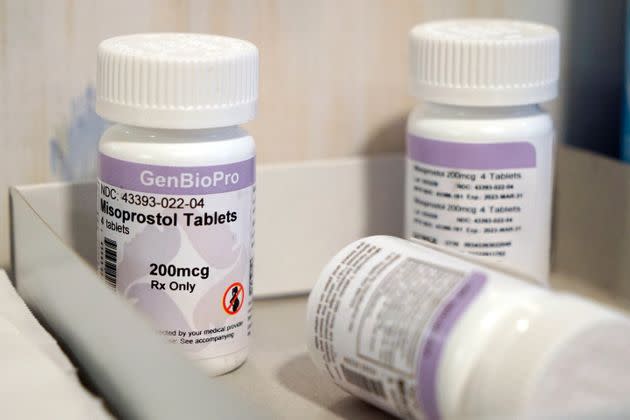White House Urgently Warns Radical Abortion Pill Ruling May Upend Everyone’s Medicine
- Oops!Something went wrong.Please try again later.
The White House message on the legality of abortion medication isn’t just about abortion anymore.
Ever since a conservative federal judge in Texas issued a decision invalidating the U.S. Food and Drug Administration’s decades-old approval of a key abortion drug, the Biden administration has been warning that such an unprecedented ruling could jeopardize access to all kinds of other medications and treatments used by millions of Americans.
“You can understand the implications of this ruling by just opening your medicine cabinet,” Vice President Kamala Harris said Wednesday at a meeting of an administration task force dedicated to protecting abortion rights. “It is very likely that you rely on some type of medication, prescribed by a doctor, approved by the FDA, to alleviate your health concerns and improve your condition in life.”
“Attacking the very credibility of the FDA on this matter, for the sake of a political agenda, could have far-reaching consequences,” Harris added.
Administration officials aren’t the only ones making this argument.
A broad coalition of pharmaceutical companies, physicians and public health experts are filing amicus briefs, issuing strongly worded press releases and basically telling anybody who will listen that ruling against the FDA could limit the availability of vital vaccines and treatments, while discouraging the kind of research that would lead to medical breakthroughs in the future.
“Undermining the FDA’s longstanding authority given to them by Congress to approve drugs would have a chilling effect on the research and development ecosystem,” PhRMA, the powerful trade group representing drugmakers, said in a statement Wednesday. “Biopharmaceutical researchers and scientists need certainty that FDA approvals will be upheld so they can make the long-term investments required to develop new medicines and ultimately get them approved for use by patients.”
The alliance between the Biden administration and pharmaceutical industry may seem unlikely, given the intense, prolonged fight they just had over drug pricing legislation. But it makes perfect sense, given their shared interest in a scientifically sound drug approval process ― and the threat that this litigation poses to it.
A Case That’s About An Abortion Drug

FILE - Bottles of the drug misoprostol sit on a table at the West Alabama Women's Center, March 15, 2022, in Tuscaloosa, Ala.
The drug at issue in the court case is mifepristone, which goes by the brand name Mifeprex and has a generic version called GenBioPro. The FDA first approved its use more than 20 years ago and doctors have prescribed it for literally millions of patients since, as part of a two-drug combination to induce abortion. It has such a low rate of reported complications and deaths that experts routinely describe it as safer than penicillin, Tylenol or Viagra.
“Medication abortion” accounts for more than half of all pregnancy terminations in the U.S. and has long drawn the scrutiny of anti-abortion groups. Late last year, some of these groups filed a lawsuit claiming the FDA violated its own procedural rules and ignored evidence that mifepristone is actually dangerous, despite its safety record.
These groups did so in federal district court in Amarillo, Texas, where they knew they would draw a sympathetic jurist in Matthew Kacsmaryk, a former deputy general counsel for the First Liberty Institute, a right-wing Christian advocacy group. He took his seat in 2019, following a nomination by President Donald Trump and a party-line confirmation vote in the Republican-controlled Senate.
Trump, the Republicans and their anti-abortion allies got what they wanted on Friday, when Kacmaryk sided with the plaintiffs, although he did so in a decision even some conservatives have attacked for its flimsy legal reasoning and right-wing pseudoscience. Among other things, Kacmaryk backed up claims of the drug’s supposed potential for harm by citing a study of anonymous blog items published on a website called “abortionchangesyou.com.”
Whether Kacsmaryk’s ruling will stick remains to be seen.
He stayed his own decision for a week, to give the Biden administration a chance to appeal. And late Wednesday, a panel of conservative judges from the 5th Circuit of Appeals overturned parts of Kacsmaryk’s order, but only parts ― in effect, allowing the FDA’s original approval of the drug to remain in place, while significantly narrowing the existing rules for prescribing and dispensing it.
“The Fifth Circuit’s decision — just like the district court’s — second-guesses the agency’s medical experts,” Harris said on Thursday. “If this decision stands, no medication — from chemotherapy drugs, to asthma medicine, to blood pressure pills, to insulin — would be safe from attacks.”
Meanwhile, a federal judge in the state of Washington last week issued a ruling that conflicted with Kacmaryk’s and now appears to be at odds with the 5th Circuit, as well. That Washington decision stems from a separate lawsuit, brought by 18 states and the District of Columbia seeking to preserve access to mifepristone. In the ruling, the judge barred the FDA from withdrawing its approval for those jurisdictions.
Even veteran lawyers are still piecing through (and arguing over) what these conflicting, overlapping rulings mean in practice. That is one reason the case is likely to end up in the U.S. Supreme Court, quite possibly in the near future, and it’s anybody’s guess what would happen there.
The justices could plausibly rule for the FDA on any number of legal grounds, including whether the organizations that brought the case even have standing to sue. Then again, this is the same conservative Supreme Court that just struck down Roe v. Wade, ending the federal guarantee of abortion rights.
While it is possible to get medication abortion using only the other drug that’s normally part of the two-drug combination, that other drug comes with a greater chance of side effects. And it’s always possible the same groups that went after mifepristone would target the second drug as well.
A Ruling With Implications For Other Drugs

Vice President Kamala Harris said Americans only need to look in their medicine cabinets to see how the ruling could ripple across American health care.
But administration officials and their allies say the long-term impact of Kacsmaryk’s ruling would extend beyond abortion drugs. In particular, they say it could undermine the authority of the FDA, which Congress empowered to make decisions based on scientific evidence.
The worry is that if a Texas judge can overrule the agency’s judgment, based on interpretations of evidence from right-wing advocates, there might be challenges to other drugs from other organizations pushing their own agendas — like groups that object to the use of antidepressants or certain kinds of vaccines.
And then there are the vaccines and treatments derived from fetal tissue, which could draw opposition from the same anti-abortion groups that challenged mifepristone.
“You’ve got this whole range of views on reproductive rights, you’ve got all the crazy conspiracy theories about vaccines and other treatments out there ― suddenly, all of that becomes fair game,” Joshua Sharfstein, an FDA deputy commissioner during the Obama administration, told HuffPost.
“Once courts or legislatures start to overrule the FDA willy-nilly, then everybody’s gonna jump in and try to interfere,” added Shafstein, who is now a vice dean at Johns Hopkins University’s Bloomberg School of Public Health.
Nicole Huberfeld, a professor at Boston University and widely cited expert on health care law, told HuffPost she thinks Kacsmaryk’s decision has already undermined the drug regulatory system, regardless of what happens with the appeals.
“It is impossible not to see this decision as having broader implications for FDA than reproductive care,” Huberfeld said. “Even if this decision is overturned, the door is open to a new line of litigation. One could see this occurring with regard to vaccines and other medications subject to political controversy. So, the FDA is challenged as an agency by a single judge’s decision that is rooted in a social movement rather than law.”
The sight of drug manufacturers standing up for the FDA might seem strange, given their frequent disputes over the speed, procedures and outcomes of drug approval decisions. But, Sharfstein noted, the industry has a big stake in a predictable, scientifically rigorous regulatory process insulated from political pressure — and patient groups do, too.
“For a judge to say, I’m gonna wake up in the morning and disrupt this process, it makes everyone else who relies on the FDA understandably nervous,” Sharfstein said. “If one judge can make a determination on one product, why can’t another judge make a determination on another product? Or a state legislature? Lawmakers could wake up in the morning and say, hey, we don’t like the way this particular treatment works.”
The pharmaceutical industry has responded with an open letter signed by dozens of companies and executives protesting the ruling. A number of pharmaceutical companies and trade groups also submitted an amicus brief to the 5th Circuit Court of Appeals in New Orleans, which ruled Wednesday in the Justice Department’s appeal of Kacsmaryk’s decision.
“Judicial activism will not stop here,” the open letter warns. “If courts can overturn drug approvals without regard for science or evidence, or for the complexity required to fully vet the safety and efficacy of new drugs, any medicine is at risk for the same outcome as mifepristone.”
A Political Fight With Strange Bedfellows

President Joe Biden bashed the pharmaceutical industry during a campaign stop in Milwaukee last fall. His administration is now making the same arguments as the industry as they battle a ruling overruling the FDA’s approval of mifepristone.
The White House, and Democrats more broadly, are happy to battle with Republicans over the merits of the lawsuit and the popularity of abortion medication. A Pew Research Center poll, conducted from March 27 to April 2, found 53% of Americans thought medication abortion should be legal in their state. Only 22% of Americans thought it should be illegal.
Only conservative Republicans clearly thought abortion medication should be illegal, by a 47% to 24% margin. Including moderate and liberal Republicans and Republican-leaning independents in the poll shows a split: 36% think it should be illegal and 35% think it should be legal.
Those numbers reflect the political hole Republicans have found themselves in on abortion rights since the Supreme Court’s Dobbs ruling last year. While every Republican in the Senate at the time except Susan Collins of Maine backed Kacsmaryk’s confirmation, few have spoken up publicly to praise his decision. (Sixty-nine congressional Republicans, including 10 senators, have signed an amicus brief supporting the decision.)
While the White House is not shying away from defending abortion rights, emphasizing the threat to prescription drugs could generate opposition to the ruling from even some abortion rights opponents, or from voters who view abortion rights as a lower priority.
That the fight aligns the White House with the pharmaceutical industry represents a break from the past two years, when President Joe Biden and other officials happily bragged about taking on the powerful lobby to give Medicare the power to negotiate prescription drugs and then hassled insulin manufacturers to cut their prices.
“We beat pharma!” Biden said on the campaign trail last fall. “We beat pharma this year, and it mattered. We’re going to change people’s lives.”
The fight also pits the pharmaceutical industry on the opposite side of congressional Republicans, who traditionally defend it and are lavished with campaign cash in response. As the liberal magazine The American Prospect noted, however, that cash is coming back to bite the industry: Corporate PACs for four major pharmaceutical companies donated nearly $585,000 to senators who voted to confirm Kacsmaryk over the past six years.
